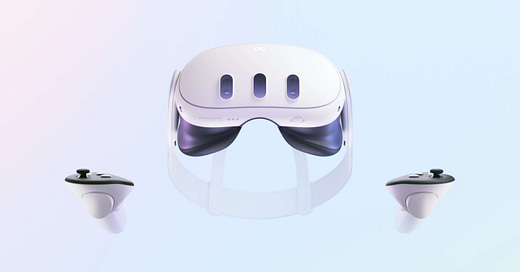Meta plans to lower the minimum age for VR – and that's concerning
Children will be able to use Meta Quest 2 and Quest 3 in the future, which previously wasn't the case
Ahead of the launch of Meta Quest 3 this fall, the company previously known as Facebook is lowering the minimum age of VR from 13 to 10, opening up virtual reality and augmented reality experiences to children and pre-teens.
Kids will still need their parents’ approval to set up an account and download apps, and time limits can also be set. And Meta says it will also provide “age-appropriate” app store experiences, and child accounts won’t be served adverts. The company’s Horizon Worlds will still require users to be 13 and older, too.
Meta’s move to lower the age restriction was shared by The New York Times, which claims discussions with regulators are already well underway. Meta appears to be pitching the move under the guise of “education”, letting kids enjoy interactive and virtual lessons that will make learning fun. However, I’m not quite convinced.
➡️ The Shortcut Skinny: Meta to lower the age requirement for VR
🗣️ Meta is working to lower the recommended age for VR
👦🏻 Previously users had to be aged 13 and up
🤔 But Meta wants to lower the new recommend age to 10 years old
👨⚖️ It’s already in discussions with regulators to achieve this
Virtual reality is still a fairly new medium and has been strictly off-limits for children due to how VR tricks your brain and eyes. PSVR 2 isn’t suitable for children, with Sony making it clear in the headset’s instruction manual that children under the age of 12 shouldn’t use the headset.
A 2014 study by the University of California also found that using VR can alter the behavior of the neurons in certain areas of your brain and that there still isn’t enough data before VR can be safely recommended for those with developing minds.
“We do not have enough data on the safety of current VR technology for children,” Marientina Gotsis, director of the creative media & behavioral health center at the University of Southern California School of Cinematic Arts told Live Science. “So, the sparsity of research data and what we know about neuroplasticity [the brain's ability to reorganize itself] and children does not make me comfortable to recommend what is available now as is.”
An optometrist from Duke University also raised concerns to ZDNet about how VR can affect children’s eyes, their depth perception, and their ability to focus. VR hasn’t been conclusively found to be harmful to children, but it hasn’t been definitively disproven either.
And then there’s another more social aspect that I think everyone will be acutely aware of. You’ve probably already seen hundreds of children glued to phones and iPads at restaurants or around the home. Putting another device into their orbit, one that quite literally tricks you into thinking you’re in another world seems like a recipe for disaster.
There’s also the very real side effect that VR can make people feel sick. I’ve experienced this first-hand with PSVR 2, which has left me feeling extremely queasy after playing certain games. If you’ve ever wondered ‘Does PSVR 2 make you feel sick?’, the short answer is yes.
Meta will be hoping its next headset, the Quest 3, will be more appealing than the Apple Vision Pro. The Apple Vision Pro price is the biggest difference between Apple Vision Pro vs Meta Quest 3, but both are promising to offer a leap in virtual reality and augmented experiences. It remains to be seen what the age restriction will be for Apple Vision Pro users.




